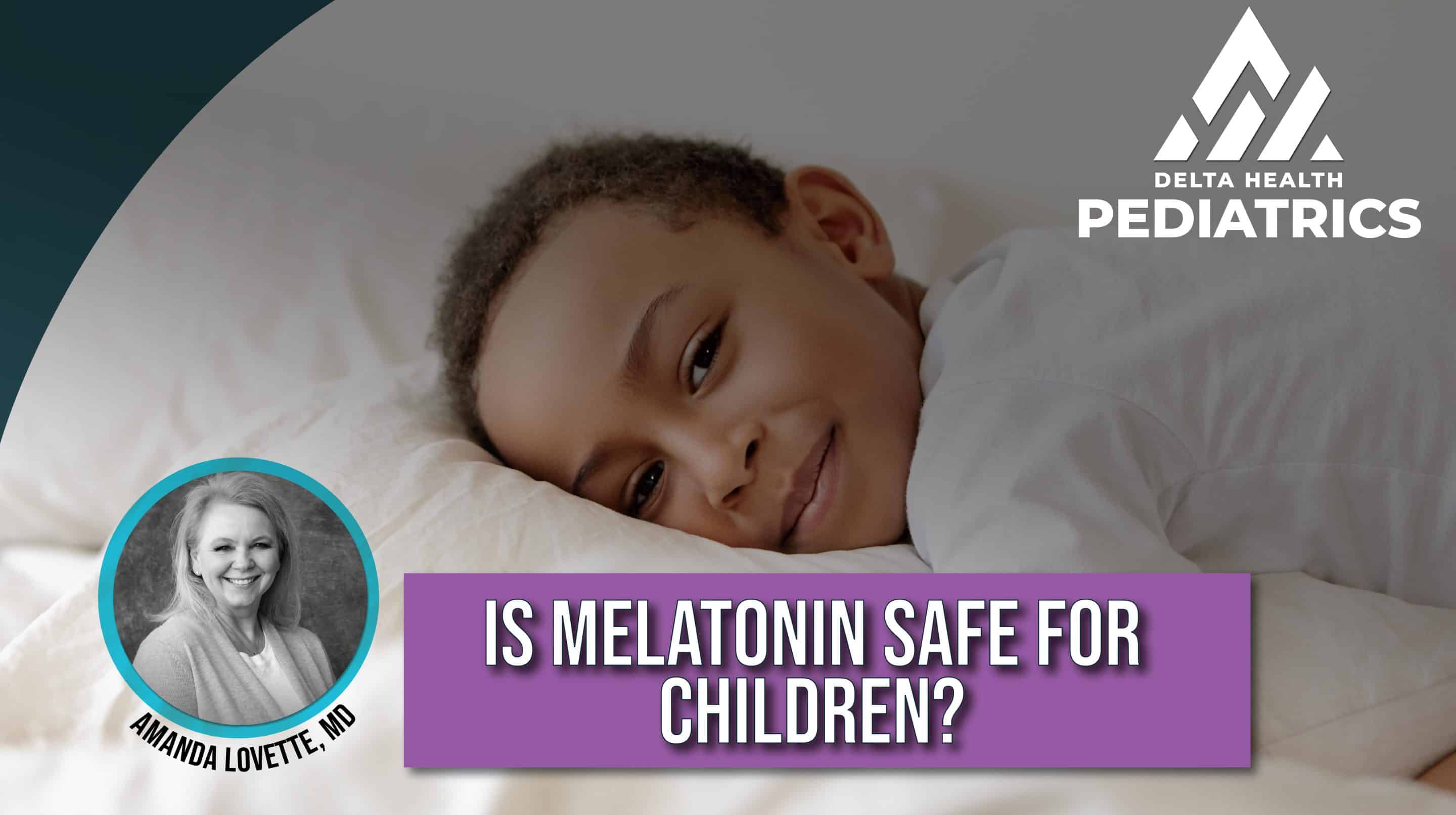Dr. Amanda Lovette, Delta Health Pediatrics
As parents, one of the main complaints we often have is that it is difficult to get our children to fall asleep and stay asleep. This lack of sleep in our children can lead to behavioral issues as well as health issues such as irritability, trouble paying attention, obesity, and high blood pressure, among other things. Many times when this becomes a pattern in our children, we turn to external sleep aids like melatonin to help them get a good night’s rest. But is melatonin safe? The short answer, yes. But keep reading for more information on how to develop healthy sleep habits for your children.
What is melatonin?
Melatonin is found in most stores as an over-the-counter sleep aid. It is also found naturally in the brain in the pineal gland. In the evening hours, naturally produced melatonin levels increase in the brain, signaling the body that it is time to sleep. Sometimes melatonin in the brain is in lower amounts and doesn’t appropriately signal the brain, or sometimes other situations like excessive stimulation or noise override the effects of the melatonin. A dose of melatonin may help signal the body and augment the effects of the natural melatonin in the brain.
How does melatonin help?
Taking melatonin at night may help some children short-term while they are continuing to work on developing healthy sleeping habits. It can be helpful in resetting sleep schedules like with jet lag, or when sleep bedtimes and wake times are interrupted by vacations and other activities. It has been used with some success in children with developmental issues like autism and ADHD who often struggle with sleep problems.
If your child is having issues with sleep, always try to fix the bedtime routines first, and if that doesn’t work, then consider melatonin as a concurrent decision with your child’s healthcare provider.
How to choose the right melatonin
Melatonin comes in many different forms (liquids and gummies among others) and each form may have differing levels of the actual drug, and the actual quality of the medication may differ between manufacturers. A label of “USP Verified” on the bottle will reassure you that the product actually contains the products listed at the amounts and potency listed. There could be other products in some formulations that create other possible undesirable effects so choose your child’s melatonin product with care.
Most healthcare providers will recommend starting a child on the lowest dose of melatonin, around 0.5mg to 1 mg, given between 30 and 90 minutes before bedtime, and in conjunction with a healthy bedtime routine.
Are there known risks to melatonin?
Understand that there have been reports of melatonin overdoses in children. In the vast majority of cases, no injuries or symptoms occurred and children recovered uneventfully, though there were a few serious injuries and two child deaths reported between 2012 and 2021. The chewable form seems to have the most variable amounts of melatonin so health experts recommend against this form of melatonin for children at this time. Keep melatonin and all other medications out of reach of children and call Poison Control at 1-800-222-1222 if you find your child has taken excess melatonin.
In larger doses, melatonin can cause uncommon side effects such as morning sleepiness, drowsiness, and possibly urination at night. Be sure to ask your child’s healthcare provider about possible interactions between melatonin and other medications your child is taking.
How to develop healthy sleep and bedtime habits
The first step in helping your child to sleep effectively and soundly is to develop healthy sleep and bedtime habits. The actual routine can be specific to your child but most children need to have lower levels of stimulation, which means lower lighting levels, low voices, a sleep environment that is free of distracting noise and light, and no electronics. Phones, video games, iPads, and computers can be the death of a healthy sleep routine. Sometimes a white noise machine set at a low level can be effective, but the noise needs to be something monotonous and without words or other things the brain will continue to actively try to interpret instead of settling to sleep.
Sleep and bedtime routines also need to be started at about the same time every night if possible – this will develop a habit in the child of going to bed around the same time. Routines are healthy and, though often difficult to develop at first, eventually will become the cornerstone of healthy sleeping habits.
Effects of blue light from devices on sleep
Of note, the blue light released by phones and other electronics like computers and tablets can wreak havoc on the natural production of melatonin and it fools our brains into thinking that it is daytime instead of night. The American Academy of Pediatrics recommends children avoid electronics for an hour before bed to minimize the impact on natural melatonin.
Figuring out a sleep routine that works for you and your family is the most important. For more advice from Dr. Lovette, join the Health Kids Western Slope Facebook Group facebook.com/groups/healthykidswesternslope.You can also schedule an appointment at Delta Health Pediatrics by calling 970.546.4000.


